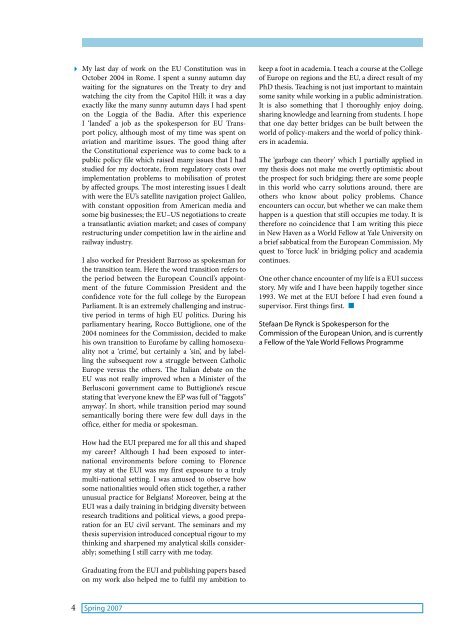Spring 2007 - European University Institute
Spring 2007 - European University Institute
Spring 2007 - European University Institute
You also want an ePaper? Increase the reach of your titles
YUMPU automatically turns print PDFs into web optimized ePapers that Google loves.
}<br />
My last day of work on the EU Constitution was in<br />
October 00 in Rome. I spent a sunny autumn day<br />
waiting for the signatures on the Treaty to dry and<br />
watching the city from the Capitol Hill; it was a day<br />
exactly like the many sunny autumn days I had spent<br />
on the Loggia of the Badia. After this experience<br />
I ‘landed’ a job as the spokesperson for EU Transport<br />
policy, although most of my time was spent on<br />
aviation and maritime issues. The good thing after<br />
the Constitutional experience was to come back to a<br />
public policy file which raised many issues that I had<br />
studied for my doctorate, from regulatory costs over<br />
implementation problems to mobilisation of protest<br />
by affected groups. The most interesting issues I dealt<br />
with were the EU’s satellite navigation project Galileo,<br />
with constant opposition from American media and<br />
some big businesses; the EU–US negotiations to create<br />
a transatlantic aviation market; and cases of company<br />
restructuring under competition law in the airline and<br />
railway industry.<br />
I also worked for President Barroso as spokesman for<br />
the transition team. Here the word transition refers to<br />
the period between the <strong>European</strong> Council’s appointment<br />
of the future Commission President and the<br />
confidence vote for the full college by the <strong>European</strong><br />
Parliament. It is an extremely challenging and instructive<br />
period in terms of high EU politics. During his<br />
parliamentary hearing, Rocco Buttiglione, one of the<br />
00 nominees for the Commission, decided to make<br />
his own transition to Eurofame by calling homosexuality<br />
not a ‘crime’, but certainly a ‘sin’, and by labelling<br />
the subsequent row a struggle between Catholic<br />
Europe versus the others. The Italian debate on the<br />
EU was not really improved when a Minister of the<br />
Berlusconi government came to Buttiglione’s rescue<br />
stating that ‘everyone knew the EP was full of “faggots”<br />
anyway’. In short, while transition period may sound<br />
semantically boring there were few dull days in the<br />
office, either for media or spokesman.<br />
How had the EUI prepared me for all this and shaped<br />
my career? Although I had been exposed to international<br />
environments before coming to Florence<br />
my stay at the EUI was my first exposure to a truly<br />
multi-national setting. I was amused to observe how<br />
some nationalities would often stick together, a rather<br />
unusual practice for Belgians! Moreover, being at the<br />
EUI was a daily training in bridging diversity between<br />
research traditions and political views, a good preparation<br />
for an EU civil servant. The seminars and my<br />
thesis supervision introduced conceptual rigour to my<br />
thinking and sharpened my analytical skills considerably;<br />
something I still carry with me today.<br />
Graduating from the EUI and publishing papers based<br />
on my work also helped me to fulfil my ambition to<br />
<strong>Spring</strong> <strong>2007</strong><br />
keep a foot in academia. I teach a course at the College<br />
of Europe on regions and the EU, a direct result of my<br />
PhD thesis. Teaching is not just important to maintain<br />
some sanity while working in a public administration.<br />
It is also something that I thoroughly enjoy doing,<br />
sharing knowledge and learning from students. I hope<br />
that one day better bridges can be built between the<br />
world of policy-makers and the world of policy thinkers<br />
in academia.<br />
The ‘garbage can theory’ which I partially applied in<br />
my thesis does not make me overtly optimistic about<br />
the prospect for such bridging; there are some people<br />
in this world who carry solutions around, there are<br />
others who know about policy problems. Chance<br />
encounters can occur, but whether we can make them<br />
happen is a question that still occupies me today. It is<br />
therefore no coincidence that I am writing this piece<br />
in New Haven as a World Fellow at Yale <strong>University</strong> on<br />
a brief sabbatical from the <strong>European</strong> Commission. My<br />
quest to ‘force luck’ in bridging policy and academia<br />
continues.<br />
One other chance encounter of my life is a EUI success<br />
story. My wife and I have been happily together since<br />
199 . We met at the EUI before I had even found a<br />
supervisor. First things first. n<br />
Stefaan De Rynck is Spokesperson for the<br />
Commission of the <strong>European</strong> Union, and is currently<br />
a Fellow of the Yale World Fellows Programme

















